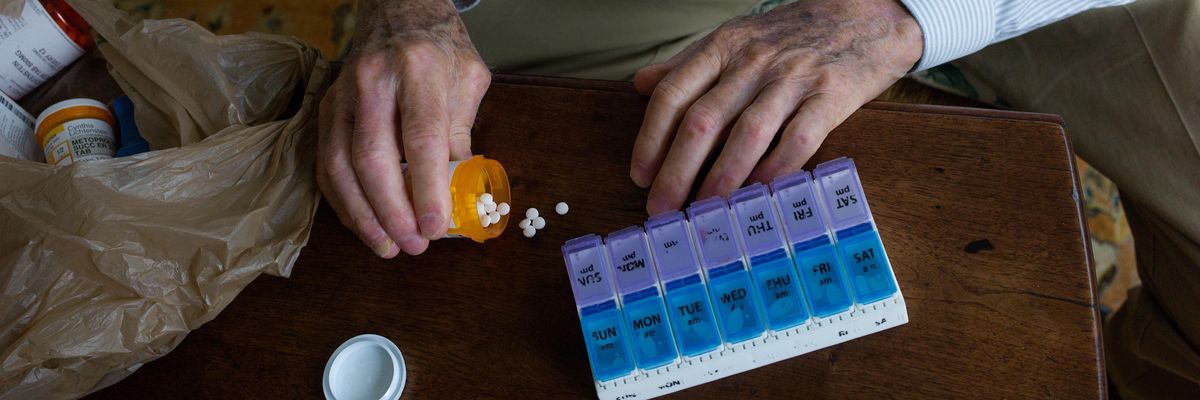

SUBSCRIBE TO OUR FREE NEWSLETTER
Daily news & progressive opinion—funded by the people, not the corporations—delivered straight to your inbox.
5
#000000
#FFFFFF
To donate by check, phone, or other method, see our More Ways to Give page.


Daily news & progressive opinion—funded by the people, not the corporations—delivered straight to your inbox.

A man prepares pills for his wife on January 4, 2020 in Sarasota, Florida. (Photo: Andrew Lichtenstein/Corbis via Getty Images)
Research published Wednesday in the medical journal JAMA estimates that close to half of all new brand-name prescription drugs launched in the U.S. in 2020 and 2021 came with an original price tag of at least $150,000 a year, a finding that sparked fresh calls for Congress to rein in the pharmaceutical industry's virtually unchecked power to drive up costs.
"Prescription drug spending in the U.S. exceeded half a trillion dollars in 2020."
Authored by researchers with the Program on Regulation, Therapeutics, and Law at Brigham and Women's Hospital, the new analysis finds that "from 2008 to 2021, launch prices for new drugs increased exponentially by 20% per year."
"In 2020-2021, 47% of new drugs were initially priced above $150,000 per year," the researchers wrote. "The trend in prices for new drugs outpaces growth in prices for other healthcare services."
The study also shows that median launch prices of prescription drugs soared from $2,115 per year in 2008 to a staggering $180,007 in 2021.
"Unbelievable," Nancy LeaMond, chief advocacy and engagement officer for the AARP, tweeted in response to the figures.
The authors of the new analysis stress that prescription medicine prices are rising so quickly in the U.S. because profit-seeking drug manufacturers are permitted to "freely set prices after approval," resulting in far higher costs than those seen in Canada, Germany, France, and other wealthy nations.
"Prescription drug spending in the U.S. exceeded half a trillion dollars in 2020," the researchers wrote. "In response to the current trends, the U.S. could stop allowing drug manufacturers to freely set prices and follow the example of other industrialized countries that negotiate drug prices at launch."
Related Content

Late last year, House Democrats passed Build Back Better legislation that contained a provision allowing Medicare to negotiate the prices of a subset of prescription drugs directly with pharmaceutical companies.
But even that modest reform--the result of a compromise with a group of pharma-friendly House Democrats--died in the Senate due to obstruction from Sens. Joe Manchin (D-W.Va.) and Kyrsten Sinema (D-Ariz.).
Advocates pointed to the new study as further evidence of the need for action from Congress as the pharmaceutical industry continues hiking drug prices in 2022.
"Americans are already struggling to afford inflated prices on daily necessities," the Lower Drug Prices Now coalition wrote in a social media post on Wednesday. "Big Pharma's yearly price hikes have pushed already sky-high drug prices into the stratosphere."
Despite his role in blocking the Build Back Better legislation, Manchin claimed last week that he supports allowing Medicare to negotiate drug prices and other reforms to cut costs.
"You literally killed the bill to do this," responded Rep. Ilhan Omar (D-Minn.).
Sen. Bernie Sanders (I-Vt.), the chair of the Senate Budget Committee, replied by pushing Manchin to drop his opposition to the Build Back Better package.
"Let's cut drug prices in half by strengthening the provision in the House-passed Build Back Better legislation to allow Medicare to negotiate drug prices like the [Department of Veterans Affairs] has done for years, and pass the whole package with 50 votes," Sanders wrote on Twitter. "It's time to vote."
Dear Common Dreams reader, The U.S. is on a fast track to authoritarianism like nothing I've ever seen. Meanwhile, corporate news outlets are utterly capitulating to Trump, twisting their coverage to avoid drawing his ire while lining up to stuff cash in his pockets. That's why I believe that Common Dreams is doing the best and most consequential reporting that we've ever done. Our small but mighty team is a progressive reporting powerhouse, covering the news every day that the corporate media never will. Our mission has always been simple: To inform. To inspire. And to ignite change for the common good. Now here's the key piece that I want all our readers to understand: None of this would be possible without your financial support. That's not just some fundraising cliche. It's the absolute and literal truth. We don't accept corporate advertising and never will. We don't have a paywall because we don't think people should be blocked from critical news based on their ability to pay. Everything we do is funded by the donations of readers like you. Will you donate now to help power the nonprofit, independent reporting of Common Dreams? Thank you for being a vital member of our community. Together, we can keep independent journalism alive when it’s needed most. - Craig Brown, Co-founder |
Research published Wednesday in the medical journal JAMA estimates that close to half of all new brand-name prescription drugs launched in the U.S. in 2020 and 2021 came with an original price tag of at least $150,000 a year, a finding that sparked fresh calls for Congress to rein in the pharmaceutical industry's virtually unchecked power to drive up costs.
"Prescription drug spending in the U.S. exceeded half a trillion dollars in 2020."
Authored by researchers with the Program on Regulation, Therapeutics, and Law at Brigham and Women's Hospital, the new analysis finds that "from 2008 to 2021, launch prices for new drugs increased exponentially by 20% per year."
"In 2020-2021, 47% of new drugs were initially priced above $150,000 per year," the researchers wrote. "The trend in prices for new drugs outpaces growth in prices for other healthcare services."
The study also shows that median launch prices of prescription drugs soared from $2,115 per year in 2008 to a staggering $180,007 in 2021.
"Unbelievable," Nancy LeaMond, chief advocacy and engagement officer for the AARP, tweeted in response to the figures.
The authors of the new analysis stress that prescription medicine prices are rising so quickly in the U.S. because profit-seeking drug manufacturers are permitted to "freely set prices after approval," resulting in far higher costs than those seen in Canada, Germany, France, and other wealthy nations.
"Prescription drug spending in the U.S. exceeded half a trillion dollars in 2020," the researchers wrote. "In response to the current trends, the U.S. could stop allowing drug manufacturers to freely set prices and follow the example of other industrialized countries that negotiate drug prices at launch."
Related Content

Late last year, House Democrats passed Build Back Better legislation that contained a provision allowing Medicare to negotiate the prices of a subset of prescription drugs directly with pharmaceutical companies.
But even that modest reform--the result of a compromise with a group of pharma-friendly House Democrats--died in the Senate due to obstruction from Sens. Joe Manchin (D-W.Va.) and Kyrsten Sinema (D-Ariz.).
Advocates pointed to the new study as further evidence of the need for action from Congress as the pharmaceutical industry continues hiking drug prices in 2022.
"Americans are already struggling to afford inflated prices on daily necessities," the Lower Drug Prices Now coalition wrote in a social media post on Wednesday. "Big Pharma's yearly price hikes have pushed already sky-high drug prices into the stratosphere."
Despite his role in blocking the Build Back Better legislation, Manchin claimed last week that he supports allowing Medicare to negotiate drug prices and other reforms to cut costs.
"You literally killed the bill to do this," responded Rep. Ilhan Omar (D-Minn.).
Sen. Bernie Sanders (I-Vt.), the chair of the Senate Budget Committee, replied by pushing Manchin to drop his opposition to the Build Back Better package.
"Let's cut drug prices in half by strengthening the provision in the House-passed Build Back Better legislation to allow Medicare to negotiate drug prices like the [Department of Veterans Affairs] has done for years, and pass the whole package with 50 votes," Sanders wrote on Twitter. "It's time to vote."
Research published Wednesday in the medical journal JAMA estimates that close to half of all new brand-name prescription drugs launched in the U.S. in 2020 and 2021 came with an original price tag of at least $150,000 a year, a finding that sparked fresh calls for Congress to rein in the pharmaceutical industry's virtually unchecked power to drive up costs.
"Prescription drug spending in the U.S. exceeded half a trillion dollars in 2020."
Authored by researchers with the Program on Regulation, Therapeutics, and Law at Brigham and Women's Hospital, the new analysis finds that "from 2008 to 2021, launch prices for new drugs increased exponentially by 20% per year."
"In 2020-2021, 47% of new drugs were initially priced above $150,000 per year," the researchers wrote. "The trend in prices for new drugs outpaces growth in prices for other healthcare services."
The study also shows that median launch prices of prescription drugs soared from $2,115 per year in 2008 to a staggering $180,007 in 2021.
"Unbelievable," Nancy LeaMond, chief advocacy and engagement officer for the AARP, tweeted in response to the figures.
The authors of the new analysis stress that prescription medicine prices are rising so quickly in the U.S. because profit-seeking drug manufacturers are permitted to "freely set prices after approval," resulting in far higher costs than those seen in Canada, Germany, France, and other wealthy nations.
"Prescription drug spending in the U.S. exceeded half a trillion dollars in 2020," the researchers wrote. "In response to the current trends, the U.S. could stop allowing drug manufacturers to freely set prices and follow the example of other industrialized countries that negotiate drug prices at launch."
Related Content

Late last year, House Democrats passed Build Back Better legislation that contained a provision allowing Medicare to negotiate the prices of a subset of prescription drugs directly with pharmaceutical companies.
But even that modest reform--the result of a compromise with a group of pharma-friendly House Democrats--died in the Senate due to obstruction from Sens. Joe Manchin (D-W.Va.) and Kyrsten Sinema (D-Ariz.).
Advocates pointed to the new study as further evidence of the need for action from Congress as the pharmaceutical industry continues hiking drug prices in 2022.
"Americans are already struggling to afford inflated prices on daily necessities," the Lower Drug Prices Now coalition wrote in a social media post on Wednesday. "Big Pharma's yearly price hikes have pushed already sky-high drug prices into the stratosphere."
Despite his role in blocking the Build Back Better legislation, Manchin claimed last week that he supports allowing Medicare to negotiate drug prices and other reforms to cut costs.
"You literally killed the bill to do this," responded Rep. Ilhan Omar (D-Minn.).
Sen. Bernie Sanders (I-Vt.), the chair of the Senate Budget Committee, replied by pushing Manchin to drop his opposition to the Build Back Better package.
"Let's cut drug prices in half by strengthening the provision in the House-passed Build Back Better legislation to allow Medicare to negotiate drug prices like the [Department of Veterans Affairs] has done for years, and pass the whole package with 50 votes," Sanders wrote on Twitter. "It's time to vote."